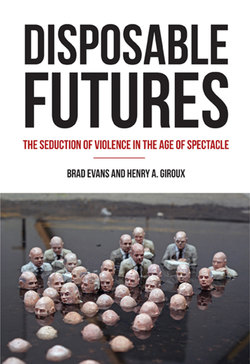Disposable Futures

Реклама. ООО «ЛитРес», ИНН: 7719571260.
Оглавление
Brad Evans. Disposable Futures
Отрывок из книги
PRAISE FOR DISPOSABLE FUTURES
“Beginning with Primo Levi and ending with Deleuze, Evans and Giroux map the radical transformation that has affected the representation of cruelty between the 20th and the 21st century: from ‘exceptional’ status, associated with the ultimate figures of state sovereignty, it has passed to ‘routinized’ object of communication, consumption and manipulation. This is not to say that everything is visible, only that the protocols of visibility have been appropriated by a different form of economy, where humans are completely disposable. To counter this violence in the second degree, and preserve our capacity to face the intolerable, a new aesthetics and politics of imagination is required. This powerful, committed, exciting book does more than just evoke its urgency. It already practices it.” —Étienne Balibar, author of Violence and Civility
.....
While individual and community access to state, national, and global audiences does open new vistas for organizing resistance, the same technology is also used by authorities to increase surveillance, and for employers to keep employees working all the time. As Brian Massumi has argued, such technology all too often can increase social control and act as “a workstation in the mass production line of fear.”44
While the association between mid-century fascism and aesthetics, and by implication its fetishistic spectacles, has been the subject of sustained critical analysis, the most promising work on the politics of the spectacle has been organized around its relationship with neoliberalism. Not, of course, to buy into the conceit here that fascism has been somehow defeated by neoliberal “conquerors,” or for that matter that neoliberalism is immune to fascistic ways of manipulating desires for political ends. Fascism remains as diverse as power. Indeed, as we shall explain, while philosophers and cultural critics have recognized in a prescient fashion the emergence of a new era of the spectacle under neoliberalism, and how such spectacles have wielded the potential to utterly transform the social order, what is particularly novel about the historical conjuncture in which we live is the ability to secure mass consent by shattering the familiar demarcations between inside/outside, friend/enemy, private/public, times of war/peace, that hallmark of ideological fascism in the twentieth century.
.....